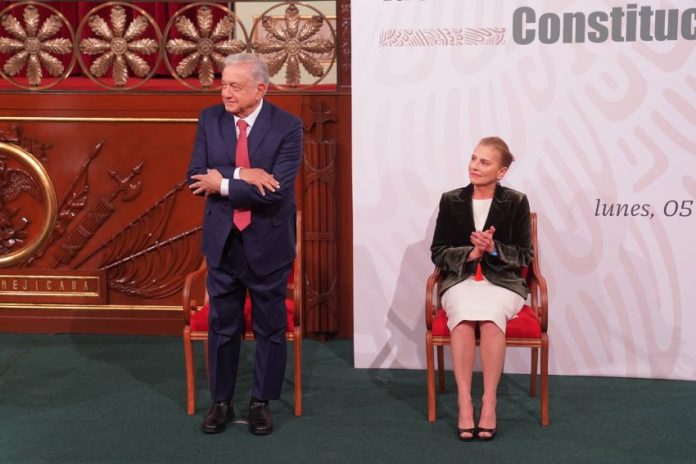In light of President López Obrador’s presentation of 20 constitutional reforms on Feb. 5, the Mexico Institute invited Advisory Board members, fellows and experts to provide analysis and commentary on individual proposals and the broader reform package.
Constitutional Changes
Ambassador Roberta Lajous
Wilson Center Fellow; Researcher, El Colegio de México; former Mexican Ambassador to Austria, Bolivia, Cuba and Spain
From the National Palace, not Congress, President López Obrador (AMLO) announced on Feb. 5 a potpourri of 18 sweeping constitutional reforms that severely downgrade Mexican democracy. If the reforms go ahead, the Supreme Court would be debilitated by having its members openly elected, independent regulatory agencies would disappear, the electoral authority would be back under the control of the president and the ongoing militarization of the police force would be formalized. At the same time, with a clear authoritarian streak, and going against all international standards and recommendations, the instances where individuals could go to prison before being judged are broadened to include even the incorrect filing of taxes. To sweeten the deal, accompanying laws propose pie in the sky pensions, which would be raised by as much as 100% of workers’ final salaries, threatening financial disaster for the treasury. These proposed changes lack the needed majority to be approved by this Congress. Therefore, they will become the electoral platform for AMLO’s handpicked successor, Claudia Sheinbaum. Once again, the president has been successful in setting the agenda for public debate but, this time, at the cost of leaving no oxygen for Sheinbaum to voice her own views.
Since there is no possibility of presidential reelection in Mexico, AMLO is seeking to prolong his power well beyond his six-year term. Sheinbaum, if elected, will have to remain under AMLO’s control and be subjected to the threat of a recently approved poll that could revoke her mandate within two years of taking office. Given the influence AMLO holds over a significant part of the electorate through his daily press conference, it will be a real challenge for the opposition candidate, Xóchitl Gálvez, to make the case against these proposed reforms. However, if anyone can successfully do it, it is her. Xóchitl is a charismatic leader who comes from poverty and discrimination but propelled herself through higher education to become a successful businesswoman and, later, a democratic politician.

Mexicans need a new government respectful of checks and balances — not this new constitution that would throw Mexico back to its authoritarian past. The last chance to rectify the course taken by AMLO will be the June 2 election, the biggest Mexico has ever had, where the two full houses of Congress will be elected along with many state legislators, governors and mayors. The unified opposition platform of the three main parties — PAN, PRI and PRD — along with civil society organizations, will present an alternative project. Hopefully they will show the muscle needed for the campaign, which officially starts March 1. Provided they remain united, this coalition could stop the militarization of society and the return to an unrestrained presidential system.
AMLO’s Last-Minute Mini-Sexenio
Alejandro García Magos
Lecturer, University of Toronto
The vertigo of losing power has finally caught up with AMLO. On Feb. 5, a seven-month “mini-sexenio” commenced, during which, at the eleventh hour, AMLO will attempt to fulfill his promise of laying the groundwork for a “transformation” and securing a place in history.
Despite five years and two months having passed without achieving his promised objectives — namely, the reduction of criminal violence and the acceleration of economic growth — it is only now, mere months before relinquishing power, that 20 constitutional reforms are being proposed to finally steer the country towards peace and prosperity.
AMLO is not the first president to try to salvage his legacy at the last minute. José López Portillo tried it in 1982 when, three months before stepping down, he decreed the nationalization of the banking sector, leaving a political and economic mess for his successor, Miguel de la Madrid. Similarly, AMLO is proposing an agenda for the next government and a change of political regime for Mexico, which is, for the time being, still democratic. Indeed, his proposals seek to dismantle the independence of the judiciary, eliminate the autonomy of electoral authorities and militarize public security. AMLO has launched these proposals (that have already foundered in Congress) like a Hail Mary pass into the end zone. It would be amusing if not for the fact that the future of the country is at stake.

This package of reforms is an implicit acknowledgment of the shortcomings of AMLO’s government and the fact that time and political capital have run out. This seven-month mini–sexenio can be seen as the tale of a president who missed his chance and now, in the twilight of his administration, seeks to leave a symbolic mark. In the absence of tangible results, laws are being proposed. Regardless of the outcome of these reforms, the quality of life for Mexicans is unlikely to change. Despite the high expectations raised by AMLO six years ago at the beginning of his government, his actual political record is underwhelming. As for the mini–sexenio, what more can be said, except that perhaps the saying about history repeating itself twice, first as tragedy and then as farce, holds true.
The Politics of AMLO’s Reform Proposals
Luis Rubio
Mexico Institute Advisory Board Member; president of México Evalúa-CIDAC and former president of the Mexican Council on International Affairs (COMEXI). He is a prolific columnist on international relations and on politics and the economy, writing weekly for Reforma newspaper, and regularly for The Washington Post, The Wall Street Journal and The Financial Times.
There are at least three factors that led President López Obrador to send Congress a package of extremely ambitious (and deleterious) constitutional amendments. The first and most obvious one is that this puts him in a position where he can advocate for a vision of the future without violating the letter of the electoral law, even though he’s doing it precisely to circumvent it. The second reason is to provoke an opposition outcry to consolidate his base. The third, and most puzzling, is to control his candidate. While the first two can be summarized as “politics as usual,” the third is the most transcendent, for it underscores the complexity of the coming race.
The context of the president’s thrust is very clear: He has spent the last five years fully devoted to the succession process now underway. Rather than push an ambitious development project, like all his predecessors did (regardless of the project’s respective merit or soundness), President López Obrador is unique in that he is concentrated on two things and two things only: eliminating or neutralizing all or most institutional checks on presidential power in an attempt to recreate the all-powerful presidency of yesteryear. And, building and securing an electoral base to win the 2024 election.

AMLO measures his success or failure by the result of the June 2 election. Now that the election looms, the question is whether he can accomplish his only objective. And the constitutional reforms are an important element in this regard.
The president has by now created a complex relationship with his anointed candidate, Claudia Sheinbaum. For AMLO to reach his goal, she must win the election; however, were she to win, she would have to alter course. The roadmap designed by AMLO will not allow her to be successful as it would only deepen the polarization in which the president thrives. AMLO cannot be repeated; nobody can duplicate his history or skills, thus making it impossible for his successor to replicate his tactics, starting with the permanent attempt to polarize and sow discord.
Sheinbaum has embraced the president’s proposed reforms, for she cannot say otherwise if she wants to win. Yet, by embracing them, she loses the support of many Mexicans who would rather seek a more harmonious government. Thus, the president’s reforms evidence the divergent interests between AMLO and his candidate, which might well create the conditions for a truly competitive presidential race.
The content of the proposed reforms is now the subject of serious analysis and debate, as they would upend not only the attempt to build a democracy over the last several decades, but also a market-based economy embodied in NAFTA/USMCA. Beyond the specifics of the proposed reforms, the politics behind them are clear: The president wants to win the coming election and will stop at nothing to guarantee that result.
This article was originally published by The Mexico Institute at The Wilson Center. A part two will follow here on Mexico News Daily.
Disclaimer: The views expressed in this article are solely those of the author(s) and do not necessarily reflect the views of Mexico News Daily, its owner or its employees.
